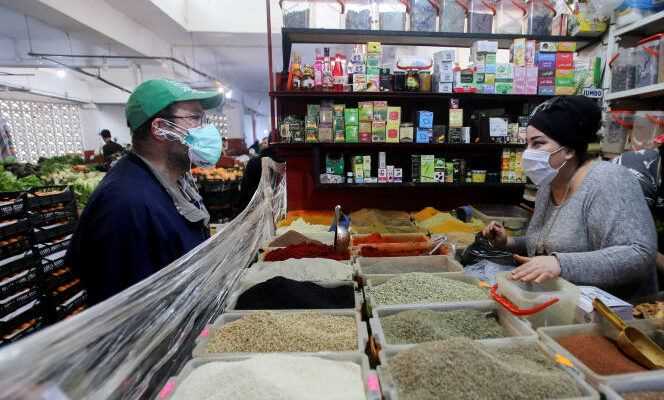“We have a president who talks to us about oil, meat and semolina”, laments Hafid. On his farm in eastern Algeria, this small breeder comments on statements made by Abdelmadjid Tebboune during an interview broadcast on April 4 by public television. While the month of Ramadan is due to start on Tuesday, April 13, the head of state assured that food products would be available. He also warned speculators, accused in recent weeks of having caused soaring prices of certain basic products, including oil.
Words that have not really reassured: the country has been experiencing a difficult socio-economic situation for several months and it is with apprehension that Algerians begin this month of fasting, synonymous with daily family reunions. “It’s not at the time of Ramadan that I’m going to restrict myself”, explains Hafid, citing the additional expenses for the various dishes – dates, fermented milk, dried fruits, cheese… – which will garnish the family table when the fast is broken. “Fortunately I have my sheep, so I won’t have to buy imported meat », Adds the breeder.
Because after oil, it is the rise in meat prices that offended consumers and led to numerous calls to boycott this product. In an attempt to reduce tariffs, the authorities proceeded in early April to issue exceptional authorizations for the import of frozen red meat from Spain. And to fight against speculative practices, the government plans to deploy 20,000 control agents across the country.
The rise in consumer prices, which is traditional at the time of Ramadan, can be explained by several factors. “The Covid-19 crisis has had repercussions on businesses, production and manufacturing networks. The devaluation of the dinar also weighed on the purchasing power of citizens ”, indicates Hadj Tahar Boulenouar, the president of the National Association of Traders and Craftsmen. The loss of value of the Algerian currency in relation to the reference currencies that are the dollar and the euro pushes up the prices of imports in foreign currencies. A trend that has direct repercussions on consumer prices, while “More than 70%” household needs “Depend on imports”, explained in December the economist Smaïl Lalmas on a daily basis El Watan.
Nearly 500,000 jobs lost
In Algeria, the average annual inflation rate reached 2.6% at the end of January 2021. Inflation “Controlled compared to what is happening elsewhere in the world”, supports the Minister of Finance, Aymen Benabderrahmane, promising a “Revival” of the national currency before the end of the year thanks to the “Launch of several development projects” which will allow, according to him, a recovery of economic activity. A perspective far from certain. “The appreciation of the dinar or its depreciation will depend on the real growth rate, macro-financial and economic indicators, legal, institutional and political stability “, warns economist Abderrahmane Mebtoul, while legislative elections are scheduled for June.
Some indicators have already turned red. Thus, since the start of the health crisis, nearly 500,000 jobs have been lost, according to initial estimates made in December by the Algerian authorities. In the construction sector alone, the country has recorded a loss of 150,000 jobs, revealed Mouloud Khaloufi, president of the General Association of Algerian entrepreneurs, to the information site TSA. “More than 70% of companies are in difficulty and operate at less than 50% of their capacity”, specifies Mr. Mebtoul.
This month of Ramadan could also suffer from another crisis: that of water, the rationing of which, initially denied by the authorities, annoys users. In Bordj El Kiffan, in the eastern suburbs of Algiers, dozens of residents blocked, on April 5, the national road that crosses the town as well as the tram lines, to express their fed-up. “The water is cut from the beginning of the evening until the next morning, but sometimes the cuts are not made at fixed times. Suddenly, we cannot organize ourselves ”, explains Latifa, a resident of downtown Algiers, worried for the weeks to come.
On March 22, the director general of Algerienne des Eaux, Hocine Zaïr, warned that the country will move towards “A reduction in distribution time slots”, with the possibility of switching to a distribution ” every other day “, if the water reserves are not replenished. Algeria is facing significant water stress, with a drop in rainfall and a dam filling rate of 44%, the official said.
Community solidarity
Faced with the controversy, the Minister of Water Resources, Mustapha Kamel Mihoubi, assured “Maintaining the supply of the population continuously during the month of Ramadan”. But in the capital, many residents, not very confident, have already made their arrangements and had their cisterns overhauled or new tanks installed, which they place on balconies or on the roofs of buildings.
As for the inhabitants of small towns which are not connected to running water, they have relied for many years on community solidarity. On his farm, Hafid had an underground reservoir dug that can hold hundreds of liters. “Whenever I need to fill it up or irrigate my trees, I call my neighbor and cousin, who has a well., he explains. I ended up installing pipes that are directly connected to its basin and I pay it by the hour to compensate for the electricity consumption of the water pump. “
When there is no domestic well, residents are forced to pay individuals, who supply them through cisterns, or travel miles to fill their cans from municipal sources.
